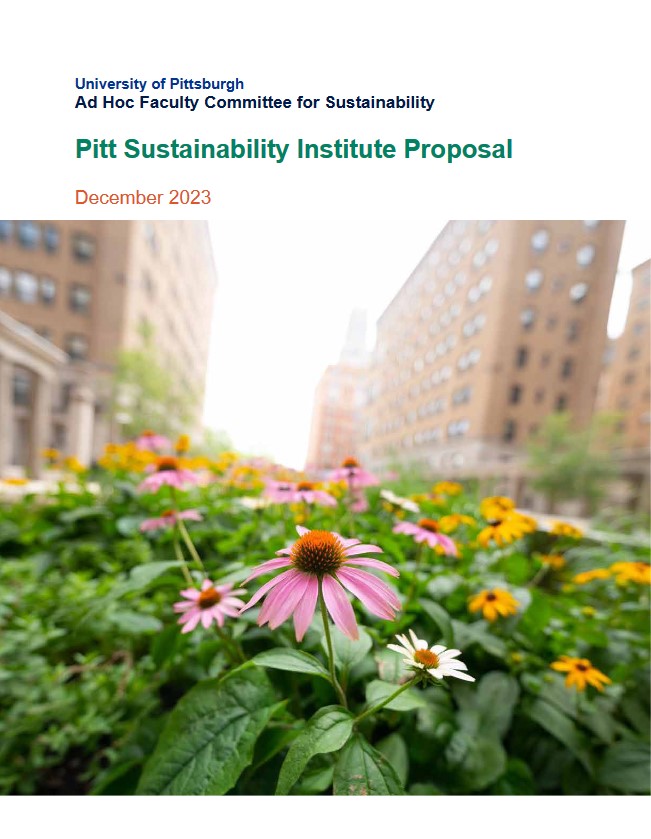Report from the Faculty Ad Hoc Committee for Sustainability (2023)
To advance the Plan for Pitt and University-wide Sustainability goals, the 2022-23 Ad Hoc Faculty Committee on Sustainability was charged by the Provost to develop recommendations for a University-wide sustainability institute, including establishing a vision, mission, and goals; identifying measurable actions to elevate sustainability research, education, and outreach; and developing a governance model, among other elements.
The Committee’s final report was published in December 2023, and looks to build on Pitt’s existing strengths to elevate a new Pitt Sustainability Institute. This Institute will assemble existing sustainability functions, create new value propositions for Pitt, and fundamentally align the University to tackle the biggest sustainability challenges.

The Ad Hoc Committee also identified strategic priority recommendations, a vision and mission, and goals.
VISION – The Pitt Sustainability Institute’s vision is to co-create research, education, and engagement opportunities by shattering silos and fostering critical connections to solve the complex sustainability challenges facing our planet while co-creating more just, equitable, and sustainable communities at the University, within the region, and around the world
MISSION – The Pitt Sustainability Institute is the collaborative, interdisciplinary hub of sustainability at the University of Pittsburgh, focused on making positive impacts that address our grand sustainability challenges. The Institute connects, strengthens, and complements existing, emerging, and exploratory sustainability nodes at Pitt.
The Committee’s recommendation is for the University to create and fund the Pitt Sustainability Institute through leadership’s visible prioritization, organizational infrastructure, and financial investment. This will occur in two parts:
Build Research Capacity within four core areas with environmental and climate justice at its core:
- Regenerative Solutions Respecting Planetary Boundaries: Water Equity, Circular Economy and Sustainable Materials, Complex Sustainable Systems, and Just Energy Transition
- Thriving Futures in the Face of Regional Change: Climate and Health, Sustainable Healthcare, Urban Food, Community Resilience, and Equitable Built Environments
- Resilient Ecological Systems: Water, Ecosystems, Biodiversity, Ecological Justice, and Natural Resources
- Reclaiming Environmental Discourse: De/Growth, Preserving Our Past to Understand Our Future, Climate Anxiety, and Environmental Justice, Film Studies, and Media Disinformation
Strengthen Education and Engagement Core to harness the momentum from the rapid growth in enrollment in sustainability education programs through:
- Co-creating Educational Offerings: Improving accessibility to our programs by co-creating sustainability course offerings across departments and schools in ways that align with and elevate each discipline.
- Experiential Learning: Creating interdisciplinary and experiential learning courses and degree programs that align with external partner needs in industry, government, and non-profit sectors.
- Community Impact: Enhancing our community impact by expanding the geographic reach of our partnerships at the local, regional, national, and international level.
Learn more about their recommendations.
Read the full report: Pitt Sustainability Institute Proposal (December 2023).